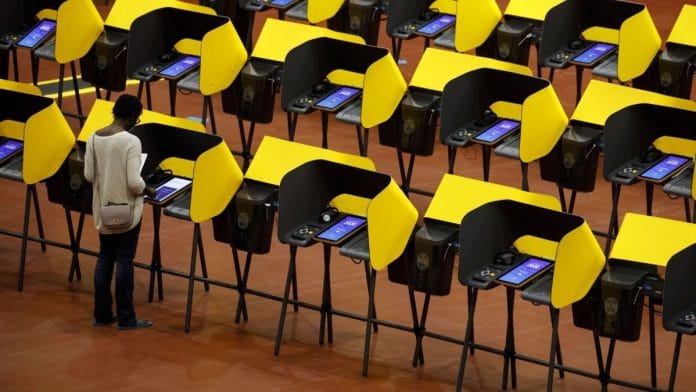Washington: Russia will continue to use disinformation to attempt to meddle in U.S. politics no matter who wins the presidential election, but a close result would intensify its efforts, current and former U.S. officials warned.
The Russian effort in a close contest would probably focus on casting doubt on the integrity of the vote, the officials said. U.S. intelligence has assessed that Russia is working to undermine former Vice President Joe Biden’s campaign.
“If it is close, expect a lot of noise about voter fraud and miscounting. This will happen in any case, but the Russians will amplify it,” said James Lewis, director of the strategic technologies program at the Center for Strategic and International Studies.
One scenario troubling U.S. officials is the possibility of simple, highly visible tactics that may create distrust about the integrity of the vote. For example, overwhelming state and local websites with traffic until they go offline — a tactic known as distributed denial of service, or DDoS for short — could create concern about the election’s integrity, which could be fanned on social media, according to an official who spoke on the condition of anonymity.
A close election would probably exacerbate the problem. The U.S. government has warned that if the vote count takes days, criminals and foreign actors might spread disinformation including “reports of voter suppression, cyber-attacks targeting election infrastructure, voter or ballot fraud or other problems intended to convince the public of the elections’ illegitimacy.”
Also read: Iran accused of hacking voter data ahead of 2020 US presidential elections
Bracing for disinformation
Officials are bracing for disinformation in the aftermath of the election regardless of the outcome, but the intensity of Kremlin influence operations — both in the days and the years that follow — will depend on how the election plays out. A decisive victory on Nov. 3 for either candidate, however, means less fertile ground for Russia in the immediate aftermath of the election.
Since 2016, other foreign powers have picked up Russian tactics. U.S. intelligence is also warning that Iran and China are working to sway voters to advance their geopolitical goals. National Counterintelligence and Security Center Director William Evanina said in a July statement that Russia prefers Trump, while China and Iran prefer Biden.
But Russia remains a primary concern for many U.S. officials and security experts given its track record and its continued brazenness in trying to influence American politics.
An easing up by Russian trolls is unlikely if President Donald Trump is re-elected. They haven’t been deterred from targeting the U.S with cyber tactics and amplifying disinformation online in his first term, even as social media companies have taken more steps to weed out foreign campaigns and domestic influence campaigns have grown in volume and influence, the experts say.
Four years after Russian actors hacked into Democratic Party emails and waged an online campaign to help Trump and sow chaos, they have continued to try to influence the current campaign, probing state and local systems, spreading disinformation on social media and sending phishing emails to political targets, according to social media companies and government officials.
‘Absolutely clear’
“I am absolutely clear that by the intelligence we have gathered, we have full confidence that the Russians are going after our elections,” said Trump’s former Director of National Intelligence Dan Coats in an Oct. 29 interview with CBS News. “They are doing it now. They are going to continue to do it.”
Biden has promised a tougher stance on Russian election meddling, and if he wins, the Kremlin may have reason to rethink the level of aggression in its use of disinformation, experts say. Regardless of U.S. response, disinformation is too effective a tool for Russia to give up altogether anytime soon, they said.
“It is asymmetrical warfare and super cheap for them,” said Darren Linvill, an associate professor at Clemson University and lead researcher in its Media Forensics Hub. The small cost of producing such attacks is virtually the only price Russia is currently paying for disinformation, he said.
Michael Daniel, who coordinated cybersecurity for the Obama administration, also said Russia won’t see much downside in continuing to use influence operations “for the foreseeable future.”
“A much tougher question is what it would take to persuade the Russians to stop or dramatically scale back this activity,” said Daniel, the president and chief executive officer of the Cyber Threat Alliance.
Biden has said his responses to foreign election meddling may range from sanctions to cyber-attacks.
“If Biden wins, the Russians will test him to see how much they can still get away with,” said Lewis. –Bloomberg
Also read: Young voters likely to break 2008 US election record, play key role in swing states






